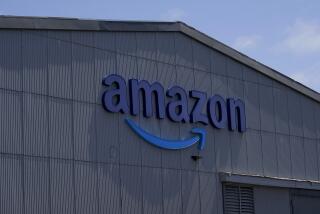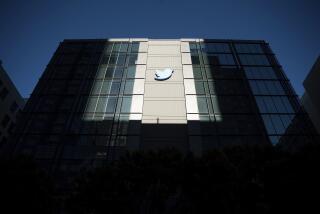General Motors to pull ads from Facebook
- Share via
General Motors Co.plans to pull its paid advertising from Facebook Inc. after the nation’s largest automaker determined its ads on the social network had little effect on consumers.
The move represents an ill-timed setback for Facebook, which is gearing up for what is expected to be the largest ever initial public stock offering of an Internet company.
In the run-up to its IPO, expected Friday, investors have been weighing Facebook’s revenue prospects and have questioned the effectiveness of advertising on the social networking site. Facebook makes most of its money from online ads.
GM, which accounts for about one out of every five auto sales in the U.S., said that it regularly reviews marketing and advertising spending.
“This happens as a regular course of business and it’s not unusual for us to move our spending around various media outlets — especially with the growth of social and digital media outlets,” said Tom Henderson, a GM spokesman.
Henderson declined to confirm GM’s decision to pull paid ads, but a source familiar with the discussions said the automaker had made the decision and would focus on creating its own Facebook content.
GM’s fan pages on Facebook appear to be popular, and may be a more effective way to reach owners and potential buyers, the automaker has found, according to the source. There are fan pages on the social network for just about every product GM makes, with the Chevrolet Camaro muscle car leading the pack because it has a large base of enthusiasts — including more than 2.8 million Facebook followers.
Chris Cedergren, president of Iceology, a West Los Angeles consulting and research firm that works with the auto industry, said social media has yet to be time tested as an advertising tool and that research has shown that “people don’t really pay attention to the advertisements.”
“This is something in its infancy,” he said. Consumer goods companies such as automakers “are intoxicated by the huge number of people on social media, but they don’t know what its real impact is for driving awareness and driving sales.”
Automakers have been tripped up by the imprecise nature of digital advertising, including what appears on Facebook, said Alexander Edwards, president of Strategic Vision Inc., a San Diego research consulting firm that works with the industry.
For example, a consumer who researched a Chevrolet pickup truck online might find many advertisements popping up for the automaker’s tiny Sonic subcompact.
“GM has not seen the success they want because they need to find people who are in the market to buy a new vehicle right now,” Edwards said. “GM is banking on creating content that will get it real intenders, people who are really looking for specific vehicles.”
GM seems to be trying to figure out the best way to hone its social media presence and reach consumers. On Monday, the automaker posted an online survey on its Facebook page: “Loyal GM customers and fans — we need your help!” the post said. “We’re always looking for ways to improve our Facebook community and would appreciate your time in completing this brief survey to let us know what you think.”
The survey asked users how they found GM’s Facebook page, why they “liked” it and what kinds of photos and videos they would like to see on its page.
Businesses often take marketing matters into their own hands on Facebook by posting messages about new products and deals on their fan pages at no cost, said Debra Aho Williamson, principal analyst at EMarketer, a digital information service.
The advertising pullback was first reported by the Wall Street Journal, which cited unnamed sources. The report said GM marketing executives met with Facebook managers to address concerns about the social network’s effectiveness and left the meeting unconvinced that further advertising on the website made sense.
But if too many big advertisers pull out like GM has done, Facebook may be forced to limit what companies can do on the social network for free.
“Part of me thinks that over time, Facebook is going to make it a lot more challenging for companies to do that because they’re in the business of getting advertising and they can control the way those messages get delivered,” Williamson said. “I think eventually Facebook is going to demand that these companies pay up.”
More to Read
Inside the business of entertainment
The Wide Shot brings you news, analysis and insights on everything from streaming wars to production — and what it all means for the future.
You may occasionally receive promotional content from the Los Angeles Times.











